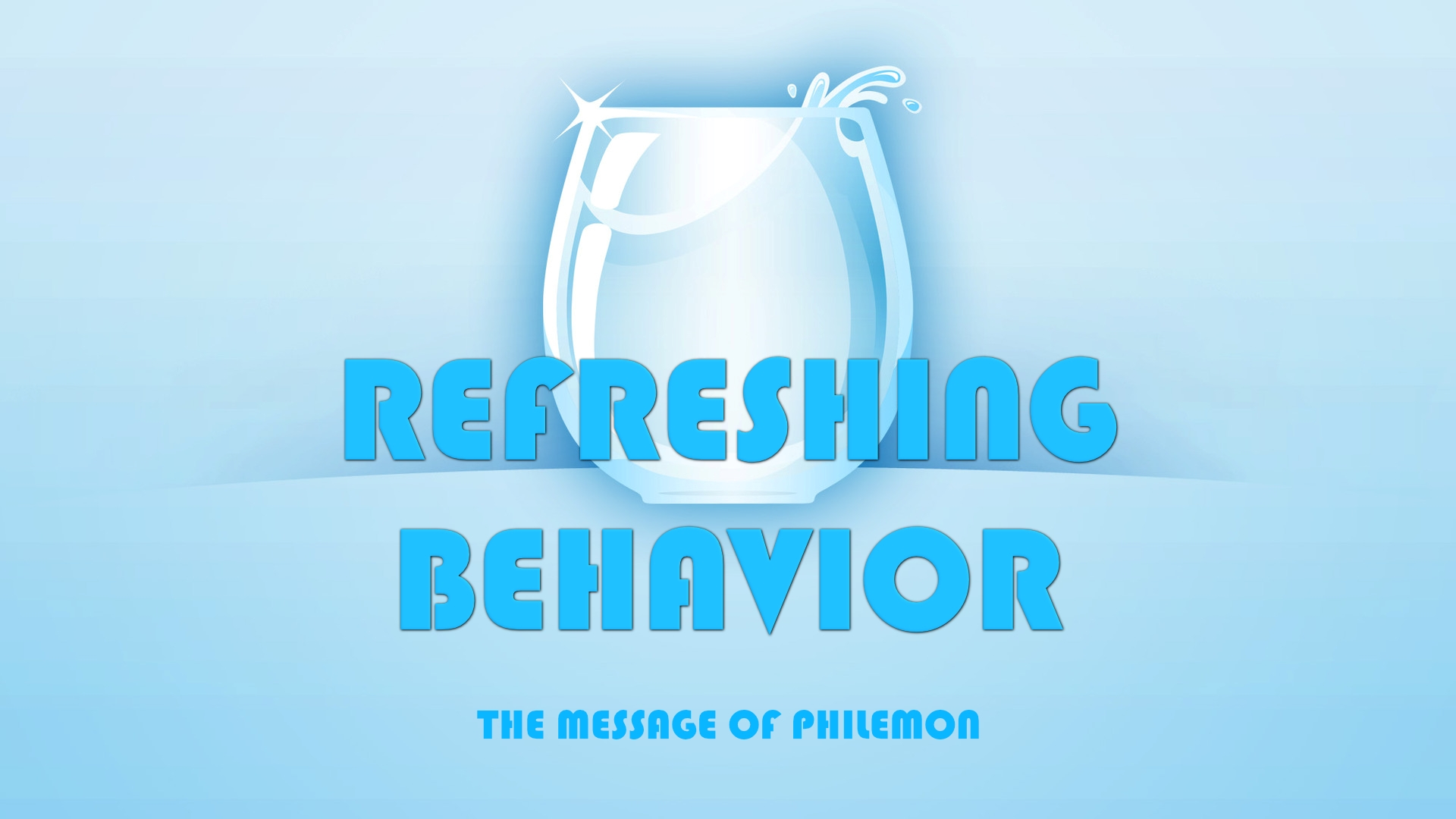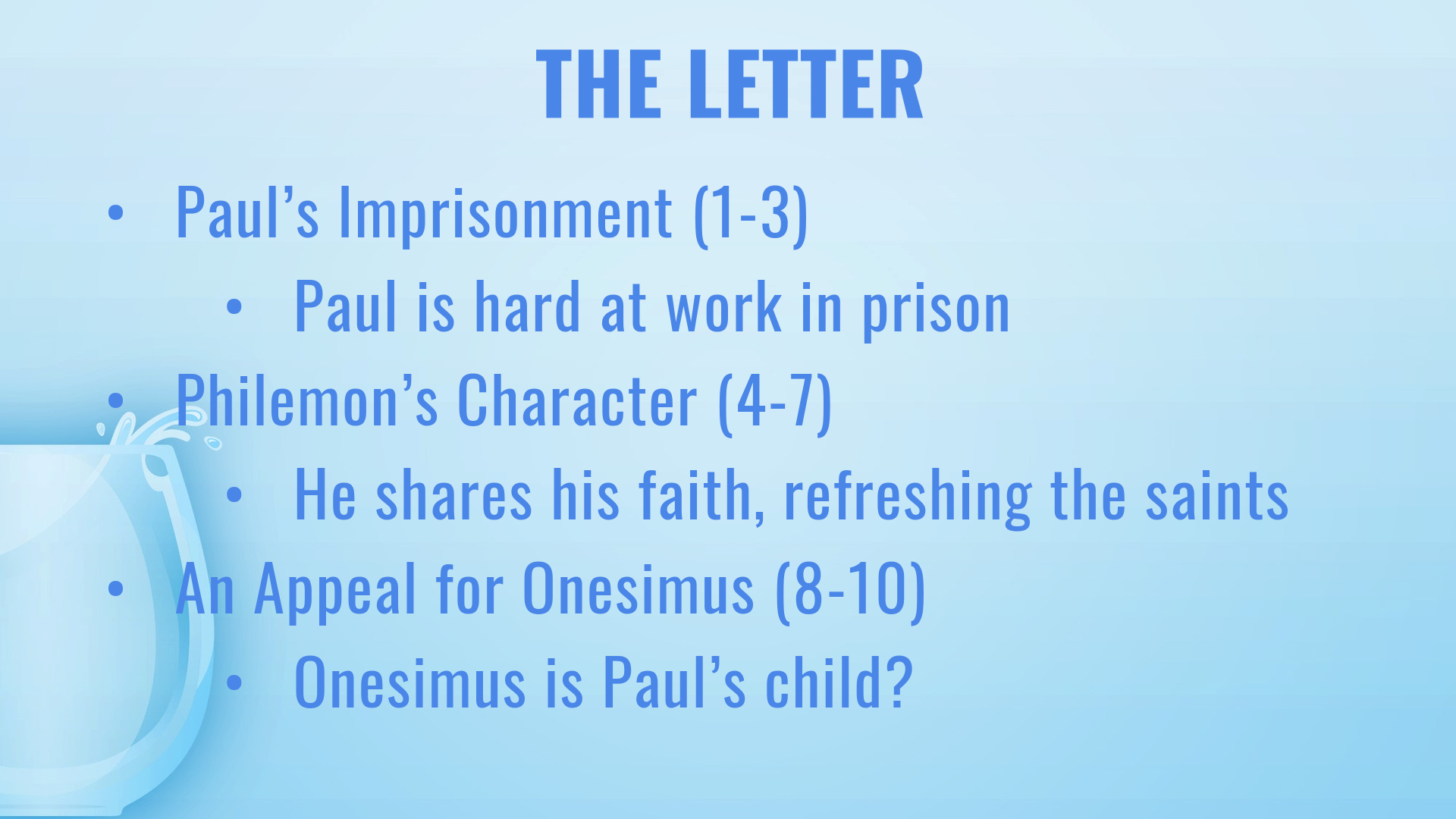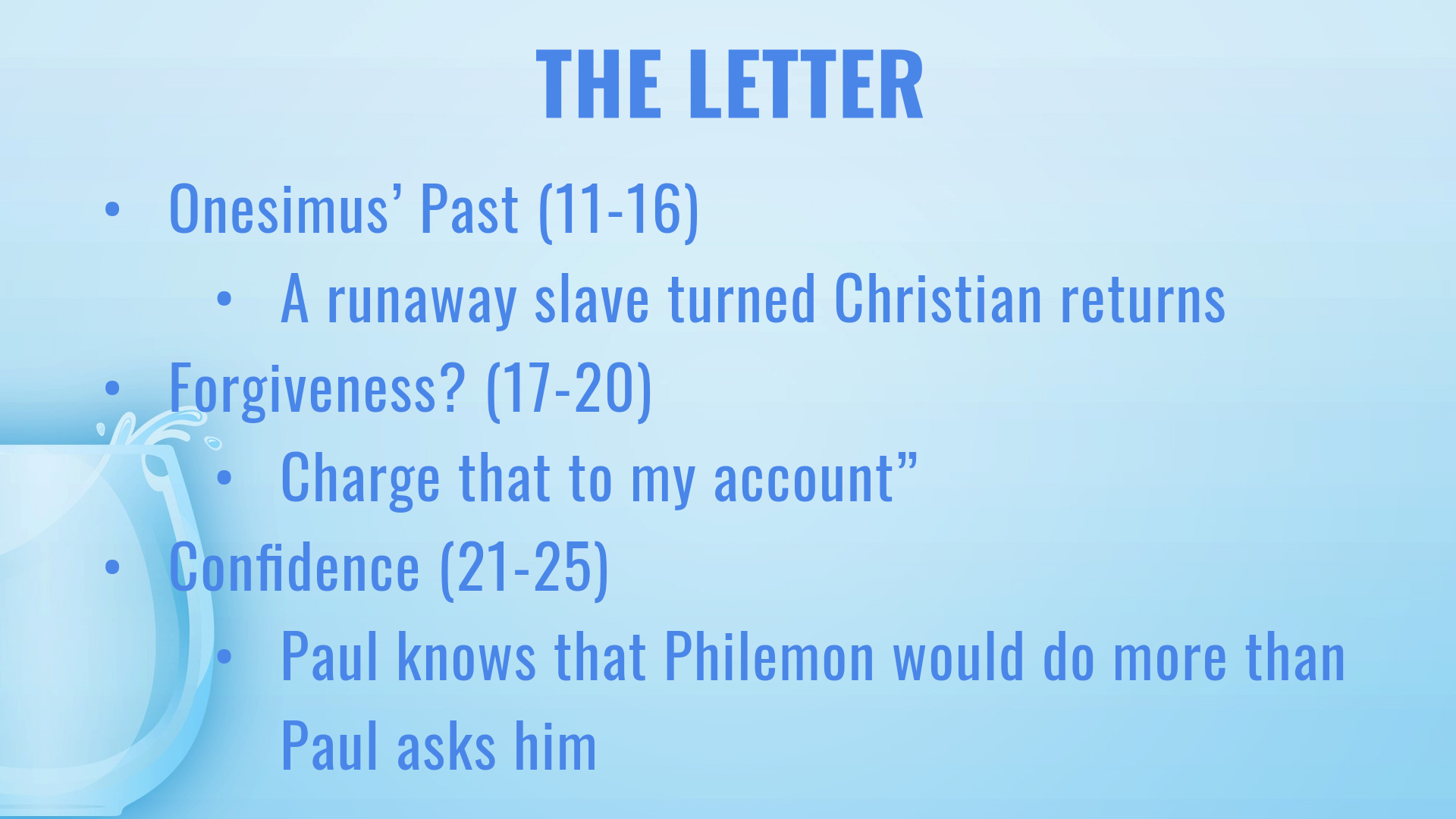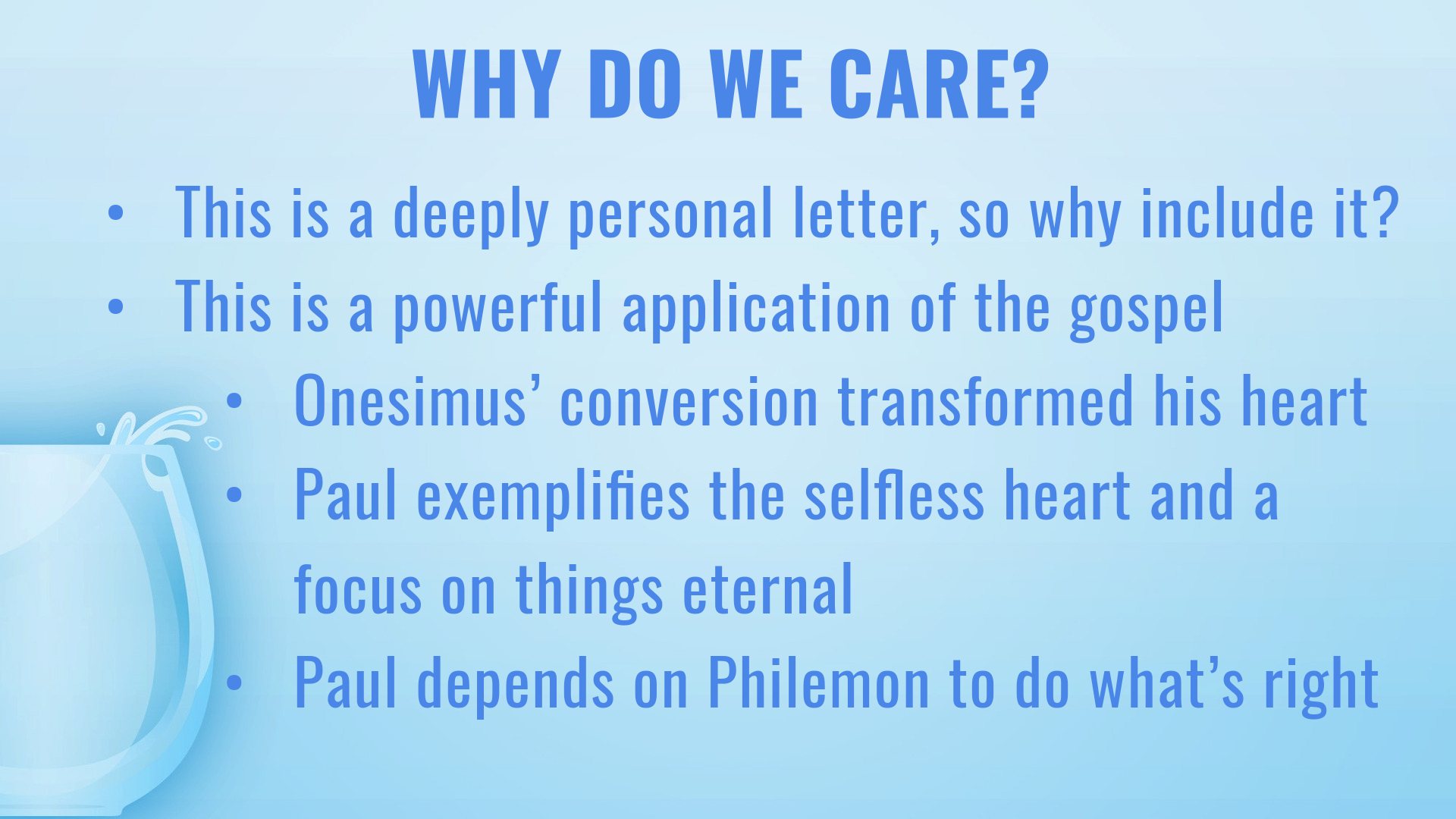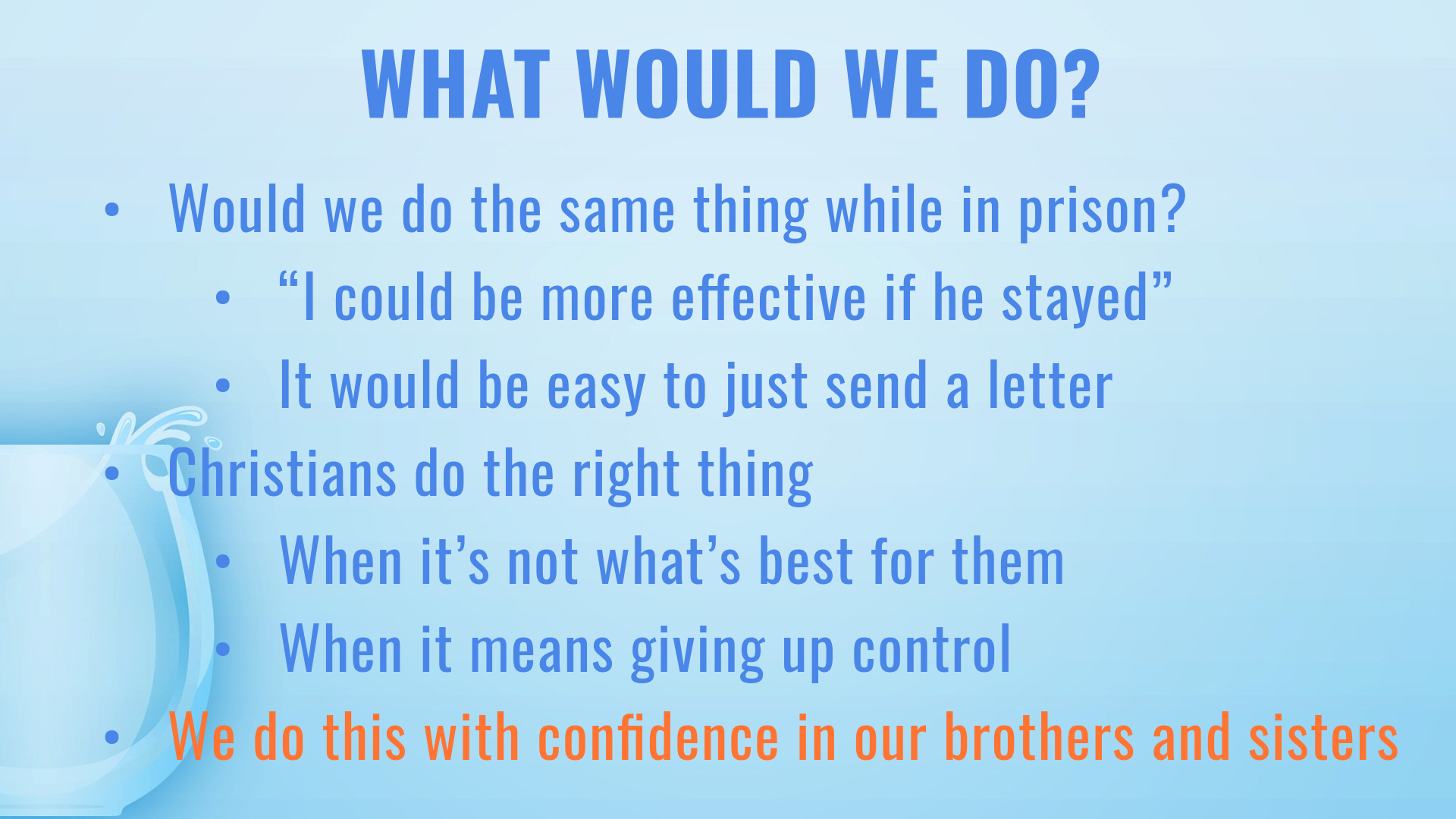Refreshing Behavior (Philemon)
Aren’t we independent and selfish to protect ourselves? We don’t act this way because we want to. We act this way because we think we have to. It’s survival of the fittest. If we don’t act independent and selfish, the other person will, and they will ruin our lives. We have anxiety over this.
Our text tonight is a wonderfully refreshing story about dependence and humility.
The Letter
Paul is writing this letter to a man named Philemon. This is an interesting letter because it is not about a church or doctrine. This is simply a personal letter discussing a secular matter. So, why would we find this recorded in our Bible? This is where the rubber meets the road or where the gospel meets real life.
Paul’s Imprisonment (1-3)
First, we learn that Paul is imprisoned when he writes this. We know from the book of Acts that Paul was imprisoned unjustly. He didn’t do anything wrong. The Romans imprisoned him to keep him safe from the Jews and prevent a rebellion. Paul is forced to live under house arrest in Rome after appealing to Caesar. Can you imagine how frustrating it would be to have that kind of restriction far away from home? But Paul doesn’t even want to go home. He wants to continue doing the work of spreading the gospel beyond Rome.
Philemon’s Character (4-7)
In the introduction, we also learn about what kind of person Philemon is, and we get a sense of why Paul would write a letter to him. Philemon seems to be a leader and devoted worker for the Lord in Colossae. As an interesting side note, it seems like Paul sent the letter to the Colossians along with this letter.
Philemon is the type of person who shares his faith with others. He is not ashamed to know the Lord, even if that means great suffering. We also find out that Philemon’s work has been refreshing the hearts of the saints as they hear about all that he has been doing.
That’s what sharing your faith with people does. It refreshes all who hear about it. So Philemon seems to be a fantastic man who loves the Lord greatly and lives to serve him. He is not independent or selfish.
The Appeal For Onesimus (8-10)
In verse 8, we read that Paul wants to act lovingly and respectfully toward Philemon. He could command Philemon to do something since he is an apostle of the Lord, but that’s not the way of Christ. Verse 10 tells us that he was appealing to Philemon on behalf of Onesimus, his child?
Paul talks about Onesimus as his child, but he explains that he became a father to him during his imprisonment. Paul met Onesimus in prison and converted him to Christ. Now, they have grown close and developed a deep relationship.
Onesimus’ Past (11-16)
Onesimus used to be a slave or servant of Philemon. This was common in those days. There were almost as many people serving as slaves as people free during the Roman empire. The relationship of slaves to their masters varied greatly, but one thing stayed the same. They were the property of the master. A runaway slave was a capital offender. Paul is pleading on behalf of Onesimus and sending him back to Philemon, his master.
Onesimus has transitioned from a useless runaway slave to a useful brother in Christ. Paul wants Philemon to accept Onesimus as a beloved brother in Christ. But he also hints at his underlying desire. He could use a brother like Onesimus. That’s what he wants, but he knows that it would be wrong for him to keep Philemon’s slave without his consent.
Do you see how this is a profoundly personal and intimate letter? Paul is communicating with a slave owner about his slave. He is explaining his decision to send the slave back to Philemon and allowing him to decide the future of Onesimus.
Forgiveness (17-20)
Verses 17-20 are critical. Paul points out that he doesn’t know the extent of the damage Onesimus has caused Philemon. Who knows what he stole when he ran away or the lingering effects? But Paul pleads with Philemon to charge Paul for it. He acts as the good Samaritan in this situation. He doesn’t know the extent of his debt, but Paul also mentions his work benefiting Philemon.
The last part of verse 20 is excellent. He tells Philemon to refresh his heart in Christ. Philemon is the type of man who refreshes the hearts of the saints. This is not a man who hoards up his riches for himself. This is not a man who holds a grudge and tries to get as much for himself as possible. What a beautiful statement!
Confidence (21-25)
I love these final words. If we thought that Paul was unsure about what Philemon would do, it becomes apparent that he’s not. He believes that Philemon would indeed accept and love Onesimus. He even says that he “knows” Philemon will do even more than he was asked. Then, Paul says that he wants to stay at his house when he gets out of prison because Philemon prays for him.
There are so many caring thoughts in this last paragraph. It’s like Paul doesn’t think negatively about this brother in Christ. He believes in him and knows through Christ he will do precisely what he ought to do.
The rest of the book is greetings similar to the greetings in Colossians.
Why Do We Care?
Now that we’ve looked through this letter, can we understand its value for us? This is not just a personal letter written to ask a favor. There is a powerful application of the gospel in this letter. This is an example of the kind of bridges the gospel is supposed to create. We see Paul depending on Philemon to do the right thing. He doesn’t take matters into his own hands or try to force Philemon to do anything. He sends Onesimus back and even offers to pay for whatever Onesimus has stolen or cost Philemon. He’s giving himself for Onesimus. I bet Philemon did exactly what Paul expected him to do. Do you know why? Because that’s what Christ would do. He would selflessly serve others. This is what we should want to see in the world around us.
What Would We Do?
When we look at this example, don’t we like to think that we would do the same thing? But would we? Paul essentially gives up control, and lets go of someone who has been a massive help to him. He does this for the sake of Philemon. Couldn’t we have come up with reasons not to do this? I might think, “I could be more effective in the kingdom with Onesimus, plus I imagine Philemon would want him to stay with me.” I might have been tempted never to mention Onesimus to Philemon. At the very least, I would wait to send him until I knew what Philemon wanted me to do. That would be a lot of wasted travel if Philemon wanted to send him back.
How often do we do the right thing when it’s not what’s best for us? This is a distinguishing mark of a Christian. It’s what makes us Christlike. But it’s so easy for us to come up with excuses and reasons not to do the right thing. I see this when I drive, but it can easily be seen in the workplace. Sometimes no one will know the difference, and it would hurt us to tell. Should we keep our mouths shut? What about the times when everyone agrees on doing the wrong thing? Should we keep our mouths shut? We don’t shine a bright light when we act selfishly like this.
Another critical thing to think about in this text is Paul’s willingness to give up control. This is not I can’t imagine what it would be like to be one of the apostles. The power and respect of Paul would probably make it easy to be proud, but he doesn’t have any of that. He doesn’t feel entitled or worthy of special treatment. He’s just asking a fellow brother to love Onesimus and him as Christ has loved all of us. Paul is willing to give up control over the situation and place it in the hands of a faithful follower of Christ. Are we willing to do that? Are we not only willing but confident about that decision? Paul seems entirely convinced that Philemon will do the best thing possible. What an encouraging statement. I wish people had that kind of confidence in me. How about you?
One thing I have struggled with is trusting Christians to act like Christ. I think Christians will act more like the world than like Christ. But I’m counting on them to provide me with refreshing. How can they do that if I don’t give them an opportunity? What about you? Are you willing to give up control and trust brethren to act like Christ? There are some fantastic people in this congregation. Will we trust them to help us? Christ calls for us to have that level of interdependence as his body.

